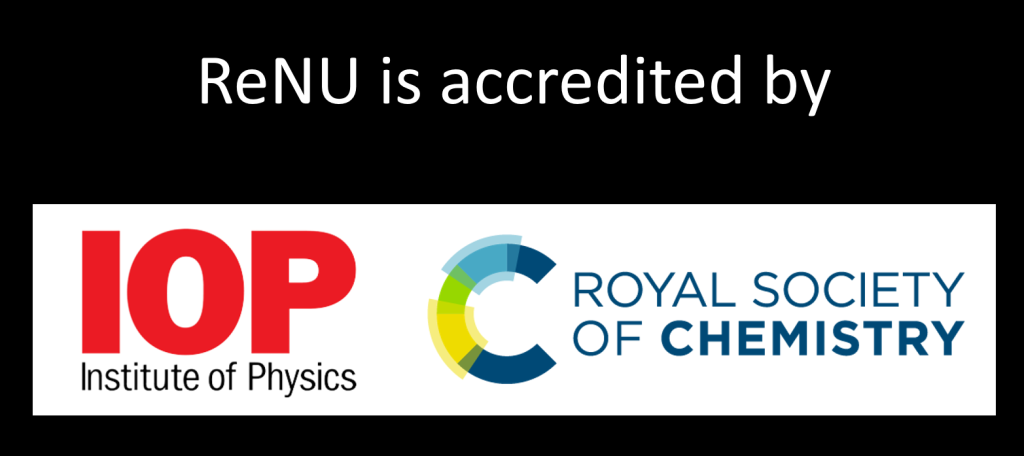Cohort 4 Students

Bethany Willis My undergraduate studies in Physics at Northumbria University introduced me to the many applications and future potential of renewable energy, this intrigued and inspired me to take part in the research involved surrounding this area of science. My PhD specialises in the manufacturing and analysis of creating sustainable solar cells and investigating their potential applications. This will be done through carrying out life cycle assessments of various solar cells then creating and testing these cells in the labs. The combination of theory and experiment in this project motivates me because it means my research can be applied to or used to support a wider variety of further research in the future. Being able to test out different scenarios via simulation and calculation whilst also collecting experimental data from the lab to support or question these simulations is interesting and provides me with a broader range of skills and preparing me for the future beyond my PhD.
I chose RENU because I think that working alongside other professionals is extremely important. I believe that the collaboration between partner universities and RENU students from other cohorts is key for the success of the research we each carry out as individuals. With a common goal in mind and grouped perseverance, the research from the team as a whole is likely to have a greater impact on the world around us.
Project Title – Manufacturing of sustainable solar cells
Supervisor – Prof Neil Beattie
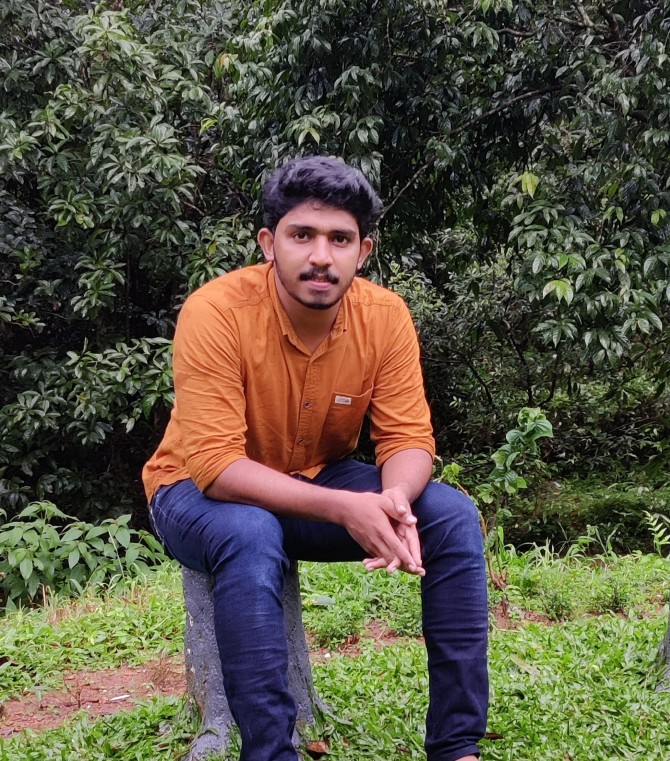
Muhammed Rishan K K I secured my Bachelor’s in Chemistry (Hons.) from Delhi University, India in 2020. Then I moved to the National Institute of Technology Karnataka (NIT-K Surathkal), India to do my master’s and in 2022 and I post-graduated in Chemistry with a distinction grade. The research exposure I had in my Master’s played a key role in intriguing me to perform Ph.D. I was working in the Organic synthesis and catalysis lab to synthesize bioactive pyrazole-based organic molecules through dipolar cyclo-addition-based synthetic methodologies. Through this project, I gained various analytical and characterization skills including NMR, IR, XRD and Chromatography. After a six-month term on this project, I submitted my master’s thesis titled ‘Trifluoroacetic acid-mediated annulation of Acrylamide / Acrylonitrile with Hydrazones’.
After my master’s, I got placed as a chemical analyst in a pharma industry. But, I was more inclined towards research with an ambition that I should explore more in academia. It was some life experience that triggered me to work on renewable energetics as a means to tackle the world’s biggest challenge of climate change. Fortunately, I found the best opportunity to work in my interested area, that’s ReNU. At Northumbria, I will be working with a research team principally supervised by Dr. Shafeer Kalathil on a project to develop a photo-biohybrid system to produce solar fuels and chemicals from CO2 and H2O by harvesting sunlight. In order to successfully defend with Ph.D., I am sure that I would be much benefited from the opportunities at ReNU.
Project Title – A living bionic leaf to produce solar fuels and chemicals from carbon dioxide
Supervisor – Dr Shafeer Kalathil, Prof. Elizabeth Gibson and Dr. Martin Hayes

Will Tetlow After studying my undergraduate degree in physics at Northumbria University, I graduated with first class honours in 2022. My final-year project focussed on the hydrophobicity of droplets freezing on different smart surfaces to help improve the safety and efficiency of engineering structures in cold climates. This process involved experimental work with droplets of multiple solutions on unique thin films and then the respective computational analysis of my results.
My PhD project within ReNU is focussed on new methods for synthesising promising chalcogenide perovskite materials for use in solar cells. This project aims to help improve the safety and sustainability, and reduce the negative environmental effects, of preparing and synthesising perovskite solar cells.
Developing new methods for the fabrication of renewable technology is an exciting prospect and one that will help the necessary transition to sustainable, green energy.
Project Title – New synthetic routes for the preparation of chalcogenide perovskite materials
Supervisor – Dr Giulia Longo
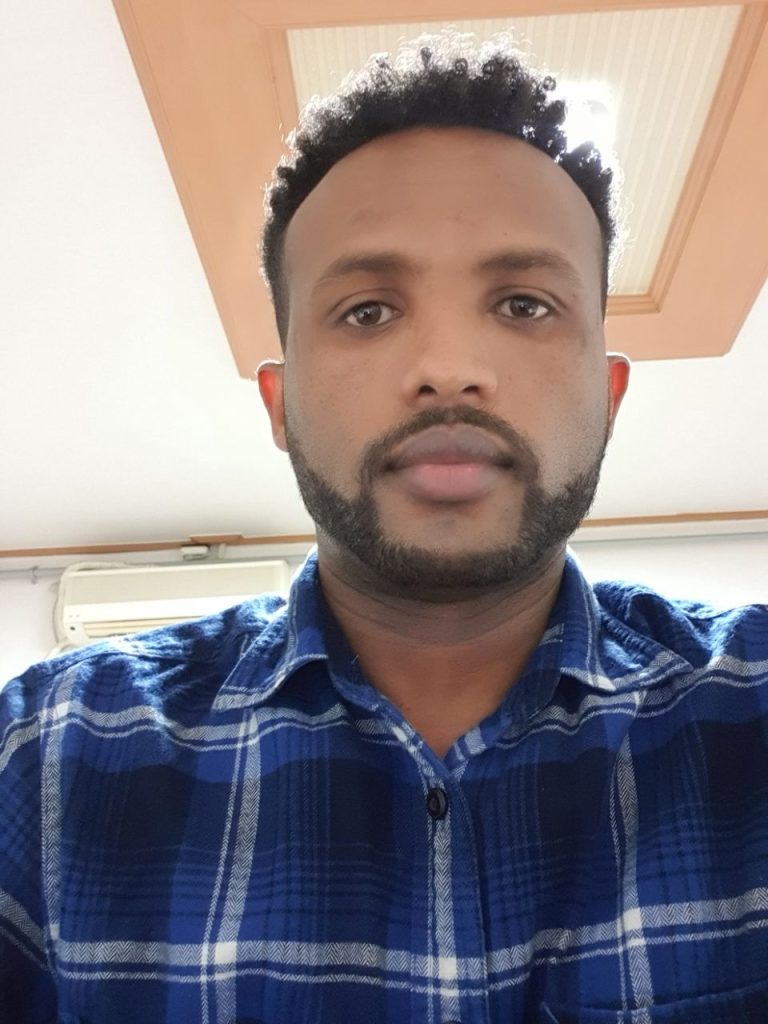
Tesfay Berhe Gebreegziabher I received my undergraduate degree in Biological and Chemical Engineering from Mekelle University, Ethiopia and I earned my research-based master’s degree in Materials Science and Engineering from Pukyong National University, South Korea. I have been very passionate about energy and the environment since the final year of my undergraduate degree during which I worked on the production of bioenergy from lignocellulosic biomass via hydrolysis and fermentation. During my master’s degree study, I extended my research to the synthesis of biomass-based porous carbon for the adsorption of various indoor air pollutant gases. Currently, I am a ReNU CDT doctoral researcher at Northumbria University. My ReNU CDT project proposes a carbon-based hydrogen storage system to achieve a net-zero carbon economy. The ReNU CDT program appeals to me due to the fact that it combines an individual research project and wide range of additional professional trainings, which make it the best of its kind.
Project Title – Carbon Materials for Hydrogen Storage
Supervisor – Dr. Yolanda Sanchez Vicente, Dr. Dominika Zabiegaj, and Dr Ronny Pini (External Supervisor from Imperial College London)

Tunde Okeowo I have a bachelor’s degree in Electrical and Electronics Engineering from LAUTECH in Nigeria, a master’s degree in Safety, Health and Environmental Management from Northumbria University in Newcastle, and a decade of industry experience. The CDT offers me a unique opportunity to carry out applied research cross-pollinated by interdisciplinary interactions within the Engineering and Environmental Sciences. My keen interest in this PhD is born from my interest in global sustainability, environmental management, and a desire for applied research with significant community impact. My current research is focused on reduction of air pollution and carbon emissions reduction in urban hospital environments.
Project Title – Sustainable Approaches to Reducing Air Pollution and Carbon Emissions in Urban Hospital Environment
Supervisor – Dr Michael Deary

Jemma Cox Graduating from Newcastle University with an MChem degree in Chemistry, my third year of study focused upon ‘Solid State Batteries; The Future of Energy Storage?’ as part of the Dawson research group, under the supervision of Dr. James Dawson. This sparked my interest in the development of materials chemistry for a more sustainable future.
To expand my understanding of the research topic I remained with the Dawson group a further year, to study the solid electrolyte material LLZO for battery applications, predicting how changes in pressure and strain would affect the LLZO structure during cycling, utilising a range of computational modelling techniques to identify defects and molecular dynamics.
My chosen PhD encompasses the development of recyclable hybrid solid electrolytes, calling upon my existing knowledge in materials chemistry, with further progression within a lab-based environment. My research will involve the synthesis of ceramic/polymer hybrid solid electrolyte materials for applications within solid-state battery systems and will be characterized using various techniques such as solid-state NMR spectroscopy and powder X-ray diffraction.
Overseeing my research are Dr. Karen Johnston and Dr. Clare Mahon at Durham University with Dr. James Dawson of Newcastle University overseeing my use of computational techniques, including atomistic modelling and DFT calculations to understand the ion mobility within new solid-state electrolyte materials.
I am looking forward to the new learning I will gain as a part of the ReNU CDT and the networking opportunities across the three partnering institutions in similar fields of study.
Project Title – The Development of Recyclable Hybrid Solid Electrolyte Materials for Battery Applications
Supervisor – Dr Karen Johnston, Dr Clare Mahon and Dr James Dawson
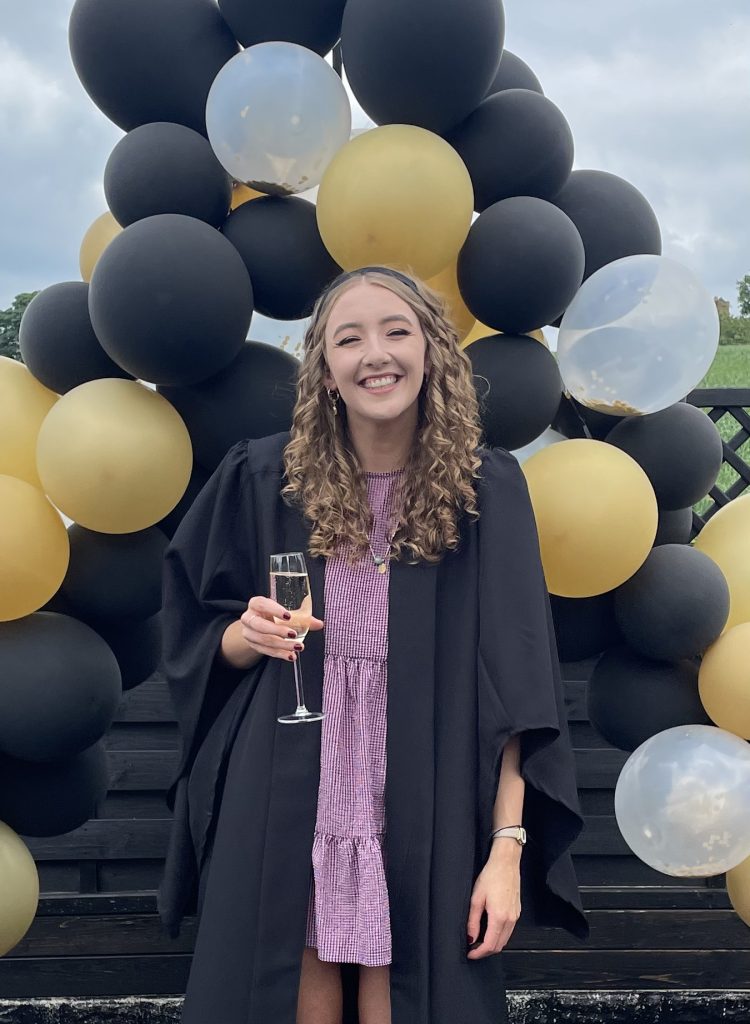
Jessica Bedward I graduated from the University of Edinburgh in 2021 with a First Class Masters in Chemistry. My MChem project involved the synthesis and characterisation of novel calcium based double-double perovskites, as part of the Attfield group. After graduating, I stepped into industry, undertaking a 12-month R&D Internship at Procter & Gamble in Newcastle. At P&G I worked on the development of biodegradable, non-toxic antibacterial hard surface cleaners. Both projects were driven by the desire to create sustainable technologies with industrial applications, something I wish to pursue further during my PhD.
My ReNU project is focussed on utilising modified zeolite catalysts for bioethanol upgrading. Bioethanol is used globally as a gasoline additive to create a more renewable fuel; however, its use is limited due to ethanol’s low energy density and high miscibility with water. Butanol is more energy dense than ethanol, is noncorrosive, and has limited miscibility with water. As such, biobutanol is a promising alternative gasoline additive if large scale production is made possible. My project aims to modify zeolite catalysts with Lewis-acid framework sites and extra-framework metal sites to catalyse the ethanol to butanol cascade pathway.
The ReNU CDT offers fantastic opportunities for cross disciplinary training and has great local and global partners working in the field of renewable energy technologies. I look forward to developing my knowledge over the next 4 years as part of Cohort 4!
Project Title – Bioethanol Upgrading Catalysed by Multifunctional Zeolites
Supervisor – Dr Russell Taylor and Dr Karen Johnston

Mian Muhammad Faisal I accomplished my undergraduate at Department of Physics, University of Peshawar, Pakistan graduating in 2015 following a teaching experience of 1.5 years at Government College Peshawar. After one and a half years of teaching experience, I decided a return to academia and started my postgraduate at Faculty of Engineering Sciences, GIK Institute of Engineering and Technology, KP, Pakistan which is ranked among the top engineering universities in Pakistan. My MS degree was fully funded by the Higher Education Commission of Pakistan (HEC) under NRPU project and GIK Institute. My master’s degree research was focused on utilizing Novel Electrode Materials for Supercapattery Devices supervised by Dr. Muhammad Zahir Iqbal (Associate Professor, FES, GIK Institute). I accomplished my MS degree in September 2020 with the success of publishing my MS research in Q1 category journals. In October 2020 I received an offer of joining Riphah International University, Pakistan (Lahore campus) as a Physics lecturer and I continued my career by engaging in teaching and research activities.
In 2022 I have been conferred an offer from Durham University, England under the Renewable Energy Northeast Universities (ReNU), Centre for Doctoral Training (CDT) program Cohort-4 to pursue my doctoral studies and I decided to join Michael Hunt’s lab in the Department of Physics. My Ph.D. is focused on sustainable energy storage, specifically the investigation of green and sustainable materials for use in energy storage technologies, emphasizing supercapacitors or any member of this family. Two approaches will be adopted: (1) development of sustainable composite electrodes incorporating pseudocapacitive materials in which faradaic processes store charge in addition to the electric double layer. (2) Surface functionalization as a route to substantially increasing the aqueous electrolyte voltage window. A range of analytical techniques, widely used in materials science, chemistry, and physics will be employed in the project including electrochemical analysis, analytical electron microscopy, tomography, and Raman spectroscopy giving a thorough background in basic techniques appropriate for energy materials. The interdisciplinary program of ReNU CDT and the worldwide ranking of Durham University were the key reasons that attracted me to join this amazing opportunity which focuses on renewable resources and the urgency surrounding the global problem of climate change. With the support of the ReNU program, training services, and brilliant minds at Durham University, I am excited to learn new skills that will help me to pursue a career in renewable energy and applied physics.
Project Title – Green and sustainable electrochemical energy storage
Supervisor – Dr Michael Hunt
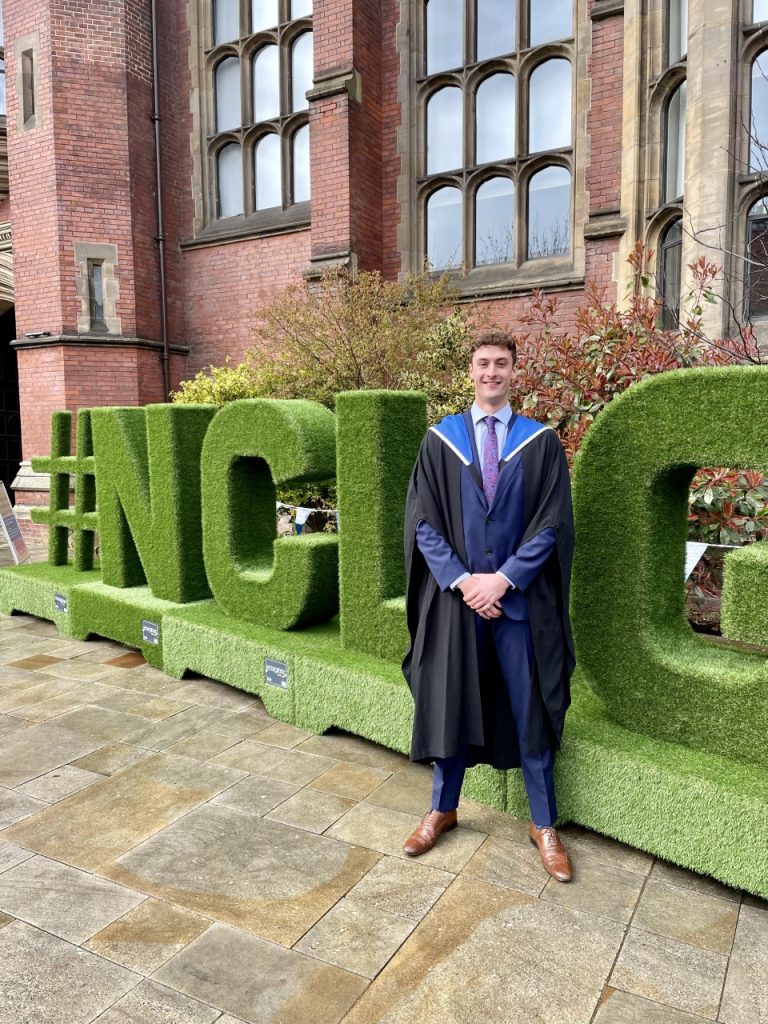
Sam Power I graduated from Newcastle University in July 2021, where I obtained an integrated master’s degree in chemistry. My master’s project focused on developing polyoxometalate-stabilised metal nanoparticles for plasmonic catalysis, which allowed me to develop my interests in both catalysis and sustainable chemistry. After taking a year out to work for Reckitt Benckiser and to travel, I decided to return to Newcastle and undertake a PhD in energy materials to further develop my passion for renewable energy technologies.
My project will focus on using polymer-immobilised ionic liquids to stabilise various metal nanoparticles, with the aim of achieving non-noble, bimetallic nanoparticles to reduce the overall cost of the catalysts. The PIIL@NPs will then be manufactured into electrodes for use in AEM electrolysers to catalyse the splitting of water into hydrogen gas for renewable energy storage.
The ReNU CDT stood out to me due to the wide variety of training in the renewable energy sector it offers to its students, as well as the unique multidisciplinary nature of the projects. This will allow me to develop a unique skillset by applying my knowledge of chemistry to practical, real-world technologies.
Project Title – Developing high performance, durable and cost effective bimetallic nanoparticles supported by polymer-immobilised ionic liquids for use as electrodes in AEM electrolysers
Supervisor – Dr Simon Doherty and Dr Mohamed Mamlouk
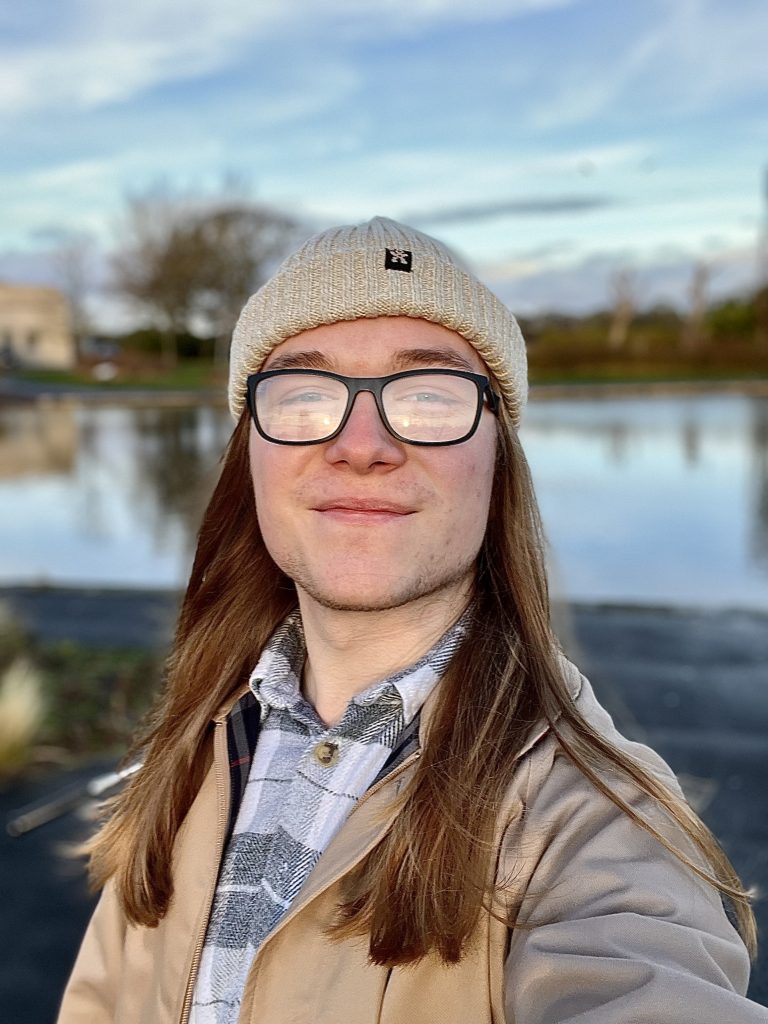
James Ramsey In 2021 graduated from Lancaster University with a combined bachelor’s and master’s degree in Physics (2017-2021). During my final year, I researched the two-dimensional semi-metal material graphene, specifically one of its strange quantum properties known as quantum capacitance. I developed a keen interest for lower dimensional materials during this time, particularly semiconductors, and hence upon finding this PhD project on the topic of Atomically Thin Photovoltaics at Newcastle University I was immediately enthralled as it drew together all the interests I had discovered during my master’s degree.
I am excited to research under the ReNU CDT programme, not only for reasons just mentioned, but because it provides an excellent opportunity to make connections, utilise some of the combined resources of the participating universities, and also frames my research in the context of renewables which aligns very well with my core values of sustainability and environmental conservation.
Project Title – Atomically Thin Photovoltaics
Supervisor – Dr Aleksey Kozikov

Joseph Thomas I started my studies at Coventry University completing my Bachelor of Science in Maths and Physics. My Bachelors dissertation was on multi-state Ising spin models applied to modelling Phase transitions in materials; this helped to foster my interest in materials. I then went to study a Master of Science in Mechanical Engineering with an advanced practice year at Northumbria. Having passed the first year, I moved onto the placement section where I had secured a research placement at Durham University modelling liquid crystal and I attended a lecture set on ferroelectric and multi-ferroic materials. After completing my placement, I started my master’s dissertation which was on using density functional theory to analyse the potential of new material as solid-state electrolytes which got me interested in applying my passion in materials to renewable technologies.
My project for ReNU is on producing novel electrolytes for use in modular water electrolysers to produce green hydrogen. The goal is to develop an electrolyte that can operate at high temperatures that has high efficiency and is easily replaceable and recyclable. I’m really looking forward to working in the CDT with a bunch of likeminded individuals who are as passionate about renewable technologies as myself.
Project Title – Novel modular and eco-designed PEM electrolyser for green hydrogen production
Supervisor – Dr Lu Xing
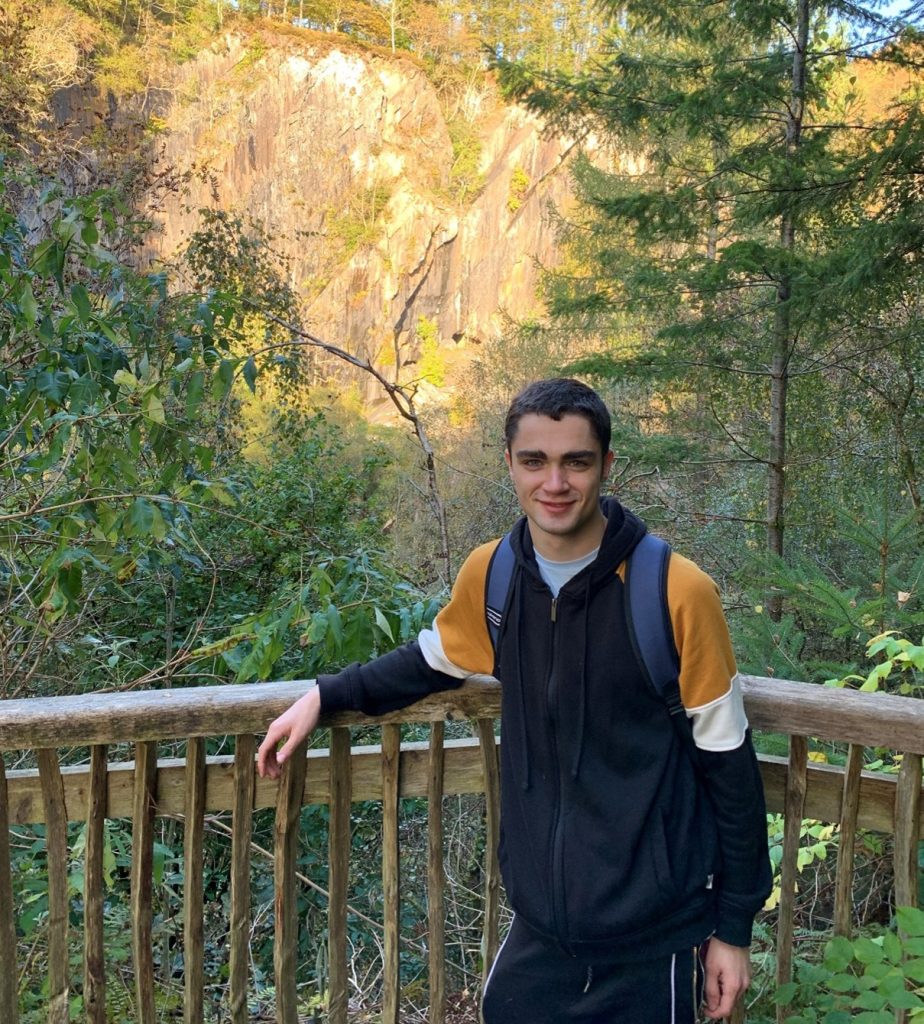
Jake Forsyth-Hughes I studied my bachelor’s degree in physics at Northumbria university. During this degree I learned about semiconductors and understood their aggregate behaviours by analysing them on an atomic level. Such information was very interesting and so I decided to pursue this further in my dissertation. For my dissertation I studied a material called zinc phosphide (Zn3P2) via simulation and why crystal defects of low and high formation energies effected the efficiencies of zinc phosphide cells. I did this by decoupling all factors and added each one to an ideal cell model one by one to see their individual effects. I was very intrigued by the facts that I learned and wanted to increase my knowledge on material behaviours.
Pursuing a PhD in photovoltaics will help me to understand a wide range of devices such as LEDS, transistors and batteries and so is not just limited to solar cells. To know about material behaviours at the atomic level will allow me to explain better the science of everyday life. The field of photovoltaics requires this knowledge in order to understand the workings of a solar cell. It is for this reason that I decided at the end of my degree to do a PhD with ReNU on a material for photovoltaics. This PhD will help me to clarify misunderstandings about material properties that I was taught in my degree as well as increasing my knowledge material behaviours.
Project Title – Exploring Bismuth Chalcohalides for photovoltaic applications
Supervisor – Dr Devendra Tiwari
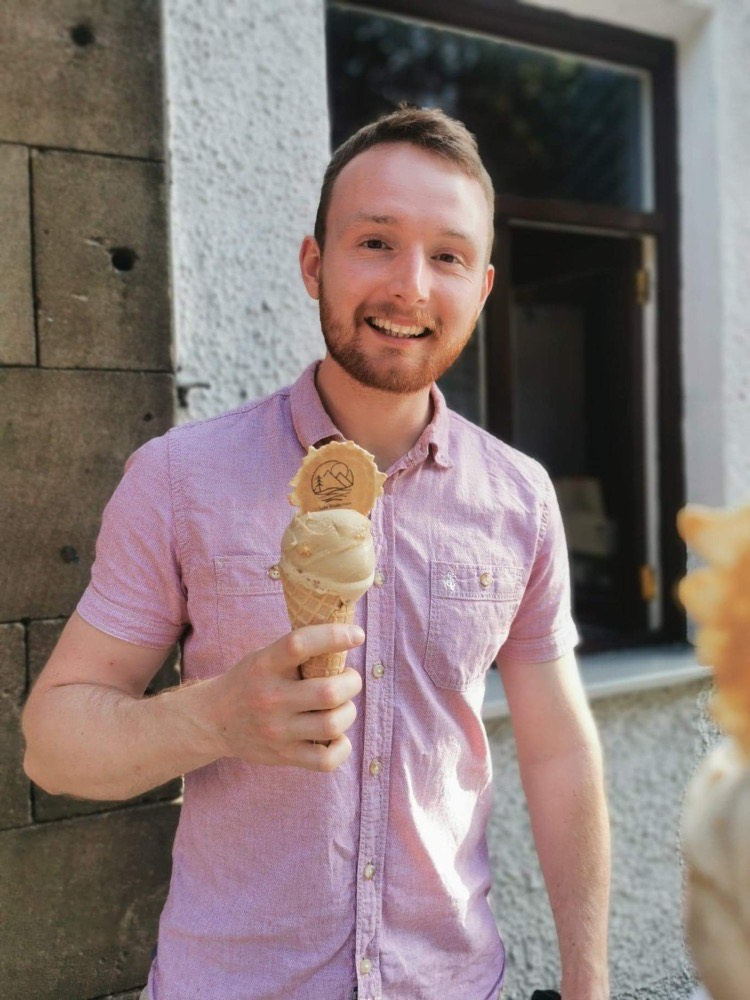
David Roughton-Reay Material Physics and problem solving related to engineering has been a key interest of mine prior to my undergraduate and masters degree. Throughout my studies at Northumbria University, I became very interested in the mechanics of Photovoltaics and the problem solving related to their function and application. My other main interest during my time at Northumbria was in fluid dynamics, specifically liquid interference and how a fluid’s characteristics can be characterised and manipulated. Which is an aspect heavily linked to this project, where the majority of the research will be in fluid manipulation to create Bio-Inspired structures which are able to be integrated into solar cells as contacts. A PhD such as this is worth pursuing due to its promising impact on the overall cost and energy consumption in PV construction. The CDT ReNU programme is a brilliant opportunity to merge my academic interest with a passion for renewable energy whilst benefiting from a collaborative research programme. I look forward to being an active member of this research area and cohort.
Project Title – Bio-inspired electrodes for energy transport applications in renewable energy devices
Supervisor – Dr Prashant Agrawal
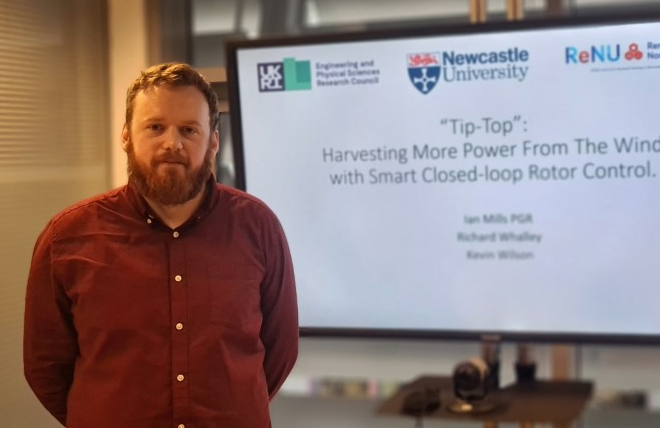
Ian Mills After 4 years of working in the Automotive industry I decided to pursue mechanical engineering at Sunderland (BEng) and Teesside (MSc) university between 2016-2020. Throughout my time in university, I have studied FEM and CFD analysis for material and flow interaction. My Master’s thesis analysed SARS-COV2 particle flow within different environments. I used CFD to generate data and images to guide further understanding of virus transmission, this thesis was then condensed and published in BioMedical. Moving on from university I became line leader at Husqvarna before changing to be a field service engineer.
Motivation to make a change to the energy problem, guided me to find a position so that I could benefit renewable energy and help to ensure net 0 by 2050. After seeing the opportunity to join the RENU and Newcastle University to develop new and innovative ideas towards wind turbine efficiency, I could not resist.
Project Title – “tip-top”: Harvesting more power from the wind with smart closed-loop rotor control
Supervisor – Dr Richard Whalley and Dr Kevin Wilson

